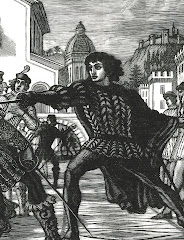A lot of my theatre consumption in the last few months has been sets of two or three plays in a day - Nicholas Nickleby (two three hour bursts), War and Peace (ditto), and Shakespeare's Histories (I did all 3 Henry VIs in 2000, and am planning to attend the all-day Henry IV-V and Henry VI marathons at the Roundhouse later in May). It's all led me to wonder what precisely the advantages (and disadvantages) of such a form is.
Versatility of cast for one thing - nearly everyone plays 5 or 6 people. The last play I was in, the Caucasian Chalk Circle, was only in one 3-hour part, but it was certainly epic in every other sense, with about 18 of us playing 80 characters. Now in Brecht's style of writing in that play, most (you could even say all!) the characters are archetypes (if you're being charitable, as I think I would be) or stereotypes (if you're not). Thus it didn't really matter if you perhaps fell into the Coarse Acting mindset of as many different accents, stoops, tics, and so on. But too much of that over 6 hours, unless it's done supremely well or as a foundation for less superficial stuff, can look more than a bit glib at best or at worst a real burden and bore.
Another is getting to really tell a story, a particular advantage in the case of a huge great novel like Nickleby or War and Peace - just simply a matter of providing more time into which to cram however many thousands of pages. With the Shakespeare, it's subtler, weaving together plays that really belong together, seeing unexpected links, and encouraging an audience to see such links - for example, having kings in some plays play servants in others, having the same actor play Richard II and III, seeing a character run a full arc through all the plays in which he or she appears (Henry IV / Bolingbroke, Hal / Henry V, Duke of Gloucester / Richard III and Henry VI). Much like the argument about great long 24 episode runs in the American style (Heroes comes to mind) as versus British 9-13 episode series (like Dr Who or Spooks, say), this ability to tell a story in a bigger (better?) way is probably the key advantage, I'ld say.
Thirdly, as well as getting to know the characters better, even reticent Brits like myself find ourselves making friends with our fellow audience members, both on the almost unconscious level of laughing, crying, gasping etc. as a whole, but also the camaraderie of sitting next to a complete stranger and coming out at the end of the day having seen such a set of plays from (literally) the same angle, and the resulting conversations and shared insights - "did you spot...?", "Do you think that worked...?" and so on. A perfect example at the War and Peace - never having read the novel, I sat next to a middle-aged man who, when he had been my age, had read the novel in between sorties whilst serving in the RAF.
And the disadvantages? Well, a numb bum for a start! - quite often the cast are applauding the audience right at the end, as well as vice versa, plus a standing ovation can be as much to renew the circulation as an act of praise! But also more metaphorically - an audience and a cast can both start to flag a bit, in concentration, spirit, and just sheer willpower. Even so, if you and they can get over these things, I still find such theatre an intriguing phenomenon.
Tuesday 22 April 2008
Well, no posts for nearly seven months...
...that's got to be some kind of a record! Quite a few new things in my life starting up right now, though, so this should give me some material. Watch this space!
Subscribe to:
Posts (Atom)
